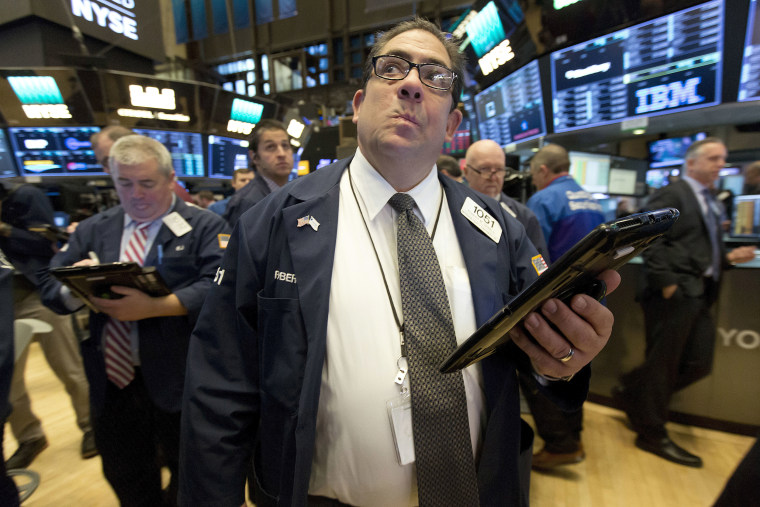A week ago, economists were cheered to see steady job growth and higher wage growth — but some now fear workers’ gains could be undermined by Wall Street’s gyrations.
Even as weekly jobless claims fell to a remarkable four-decade low on Thursday, the market’s wild ride entered its second week with a volatile Friday. The major indices toggled between gains and losses through the morning, with the benchmark Dow Jones trading in a 700-point range over the first half of the day.
When the market was soaring to new heights on a near-weekly basis, most ordinary Americans didn’t benefit from this increase in value. The silver lining is that, on the flip side, Main Street activities like hiring new workers or raising pay are somewhat insulated from Wall Street upheaval. As evidence, economists point to the 1987 stock crash, which shaved more than 20 percent off the market’s valuation without tanking the broader economy or leading to a spike in unemployment.
“The stock market is what economists call a leading indicator of the business cycle, the real economy, while the labor market is a lagging indicator,” said said Lu Zhang, a professor of finance at Ohio State University who has studied correlations between stock prices and the labor market.
The upshot is that rank-and-file workers don’t need to worry about their jobs disappearing or their paychecks shrinking — at least not right away. “Stock market volatility by itself is unlikely to change many hiring plans,” said Andrew Chamberlain, chief economist at Glassdoor.com. “It has a very minimal impact on the labor market in the short term.”
Pete Sanborn, managing director of human capital advisory at Aon, pointed out that most big companies put together their budgets for hiring people and increasing compensation back in the fall, so even the major indices erasing their gains for 2018 wouldn’t change the outlook. “For most companies, they’re looking at the earnings commitments they’ve been making, and we know earnings overall have been relatively strong,” he said. “Their plans are still realistic.”
What’s more, market observers have been predicting a pullback for some time. “The fact that they might be vulnerable to a sudden decline in prices could not come as a surprise to the people who were paying attention to the discussion,” said Gary Burtless, a labor economist at the Brookings Institution.
In the long term, though, experts say a sharp correction into bear market territory (the Dow was about halfway there as of the end of the week) could have ripple effects on the broader economy. “The fact of sharply declining prices might undermine both consumer and investor confidence,” Burtless said.
“For some people, there’s a fear there now that this is the first shoe to drop,” said Brian Kropp, HR practice leader at Gartner. Specifically, anything that shakes confidence enough to crimp consumer spending could be trouble. “If those purchases start to pull back, that can create a cascading effect,” he said.
The volatility cluster
Although a slow descent into bear market territory could be challenging for businesses, it’s not the worst thing that could happen. A sustained period of volatility marked by wild swings in both directions could be a more destabilizing — and therefore risky — force.
It also looks probable, Zhang said. “A lot of our understanding of financial data indicates that volatilities tend to cluster,” he said. “If historical evidence is any indication, I would say the high volatility period is going to last for a while.”
“When things change there’s always volatility… You would expect everyone to recalibrate,” said Alicia Sasser Modestino, an associate professor of public policy and urban affairs and economics at Northeastern University. “I think if you see it persist beyond the next month or so, that might signal we’re more worried about the longer term.”
Even though the recent tax cuts have left corporate America flush with cash, Modestino said companies today have to contend with a few big unknowns: There is concern that the new Federal Reserve chairman might raise interest rates more quickly than anticipated, worry that a bull market already long in the tooth could be more vulnerable to economic shocks, and knowledge that tax cuts today portend a burgeoning deficit that will have to be addressed at some point.
“We may be entering a period where companies are slowing down or putting off their expansion plans, taking a wait and see attitude,” said John Challenger, CEO of executive outplacement firm Challenger, Gray & Christmas. “That’s why this is so significant — everyone knows we’ve been in this long expansion [and] when you get to these points, the risk of recession starts to loom,” he said. “This may be the signal that says to corporate leaders, ‘Be more careful now, we’re into the ninth inning.’"
